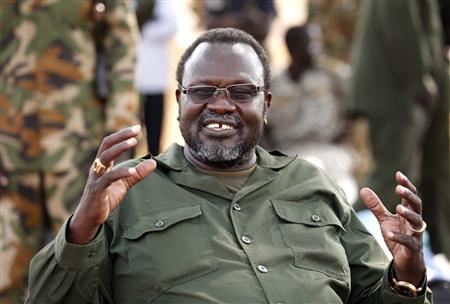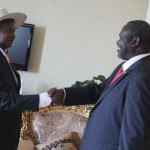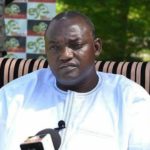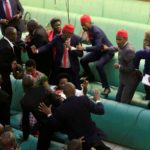The family of South Sudanese rebel leader Riek Machar say they’re disappointed in a decision by the East African regional bloc IGAD to impose conditions on his release. The former vice president has been under house arrest in South Africa since 2016.
Recently, the Council of ministers of the regional bloc called for South Sudan’s former vice president to be freed from house arrest in Johannesburg.
“Every time we asked who was keeping him in South Africa, we weren’t given any answers. At least somebody has admitted now responsibility, now we’ve got answers,” Machar’s wife, Angelina Teny, said Thursday, in response to IGAD’s decision.
Riek Machar fled the South Sudanese capital Juba in July 2016 after fresh fighting broke out, jeopardizing renewed efforts to restore the August 2015 peace agreement.
With limited options available, Machar ended up in South Africa, and was placed under house arrest thereafter.
“We are not even aware why he’s there,” said Teny, who is also a senior opposition member. She also expressed astonishment that IGAD “would attach conditions to his release.”
They include the obligation for the leader of Sudan People’s Liberation Movement-in-Opposition (SPLM-IO) to renounce violence and refrain from obstructing the peace process.
“We’re not aware that Riek Machar has been engaged in any personal violence, that he had to personally renounce, so we see that that is baseless,” Teny retorted.
A statement issued by officials from the eight countries in the bloc also added that Machar should “be allowed to relocate to any country outside the region and not neighbouring South Sudan.”
“IGAD is basically trying to transfer him from one prison to another,” Teny says in response.
“We don’t know what crime he has committed that justifies him being kept for a year and a half without charge.”
Machar was an instrumental figure in South Sudan’s fight for independence from Sudan. Yet since his exile, he has been frozen out of the peace process, angering members of his armed opposition.
Moreover, the decision by IGAD to transfer the rebel leader to a country outside of the East African region, has further strengthened suspicion that the regional bloc is biased in favour of Kiir.
“Isolating the SPLM-IO, then deciding to house arrest our leader, brings questions even to the process that IGAD is leading, and their impartiality in the process,” challenges Teny.
IGAD, together with regional and international partners, have been trying to revitalize fledgling peace talks. Their efforts saw Machar declare a cessation of hostilities with the government of Salva Kiir on December 21, 2017.
Scarcely a day later, however, it was back to business as usual, as offensives were launched by both sides and President Salva Kiir demanded that diplomats and journalists cease publishing ‘negative’ reports.
The conflict, which began in 2013 as a political fallout between Machar and Kiir, has escalated into ethnic violence and the displacement of over 2.2 million people.
Today, the world’s newest nation should be benefitting from its rich oil reserves. It is instead facing famine and severe food shortages. And the patience of the international community is running out.
How much of the multi-layered conflict – that has at various times implicated Uganda, Sudan, Kenya and Ethiopia – can be blamed on Machar? His wife maintains that the rebel leader has always sought peace.
“In fact, the war has been a war of resistance, against the government’s scorched earth policy ” explains Teny, which even rights groups have denounced.
Future of South Sudan
However, rights groups have also accused Machar of recruiting youth from Uganda to try and shore up the ranks of the SPLM-IO. These allegations have been dismissed as “baseless” by Teny.
“We actually have a policy of non-tolerance,” she defends, before acknowledging that one of their commanders in Western Bahr El Ghazal, recently handed over 14 children that were found to be among their ranks.
“I’m not going to say that the SPLM-IO is 100% on the right and this and that. Sometimes things do happen, but they’re not policies.”
On the future of South Sudan, Teny maintains that a lasting peace agreement can only be achieved if IGAD can show its “impartiality.”
If the bloc is truly serious about peace, then it should put pressure on all of South Sudan’s leaders, not just Machar, she insists.
“IGAD is actually using words that are coined by Juba. For example, ‘renunciation of violence,’ this phrase emerged in Juba in 2016 and has now become part of IGAD’s statements and communiqués!”
To end the cycle of failed ceasefires that have tarnished the image of the world’s youngest nation, Teny says that “IGAD must be neutral.”








